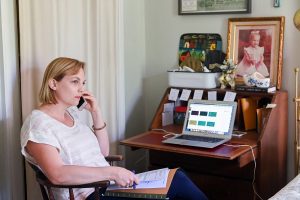Every day, Jasmine Pulliam and Mary Ferris get on their phones and make a handful of calls. Each time, they ask the person on the other end a list of questions:
- How are you feeling today, well or unwell?
- Are you experiencing coughing?
- Are you having difficulty breathing/wheezing?
- Have you experienced fever, chills or body aches?
- What was your highest temperature in the last 24 hours?
- Do you have any questions or need to tell me anything else?
They aren’t talking with friends or relatives. In fact, they’re having the conversations with complete strangers.
Both Pulliam and Ferris are in the Master of Public Health program at the University of Tennessee at Chattanooga. Along with athletic training students, undergraduate pre-med students and faculty in the Department of Health and Human Services, they’re touching base daily with people who have had contact with someone ill with coronavirus.
None of the people being interviewed actually have the virus; the goal is to track whether they eventually show symptoms or not. From there, health officials can determine where the virus might have previously been, where it might spread and the number of patients suffering from it.
Pulliam has five subjects to call daily and said they have been “very calm and aware of the situation.”
“They are very cooperative and open to answering questions,” she said.
Ferris, who has two interview subjects but expects to have more assigned, describes the people as “upbeat and friendly and have not seemed worried.”
Dawn Ford, clinical associate professor with the Master of Public Health program, trained 61 volunteers on procedures, which were developed by the Hamilton County Health Department. From there, the Health Department gets in touch with her when it has people that need tracking, Ford said.
“I assign the contacts to the volunteers and do a quick just-in-time training to go over the specific instructions,” Ford said.
While the Master in Public Health program focuses mostly on preventing and controlling chronic diseases, “there is overlap in how public health workers respond to both infectious and chronic diseases,” Ferris explained.
“As the severity of this novel coronavirus became more apparent to our cohort, we began looking for ways to incorporate our public health studies with the local response,” she said.
UTC MPH students are also involved with the Health Department’s Twitter campaign #AlonetogetherCHA, which promotes social distancing.
“It is a privilege to be able to contribute to local efforts in combating this pandemic,” Ferris said.

Mary Ferris works with the Health Department from her home Thursday, April 9, 2020, to check on people who have come into contact with someone who tests positive for Covid 19.